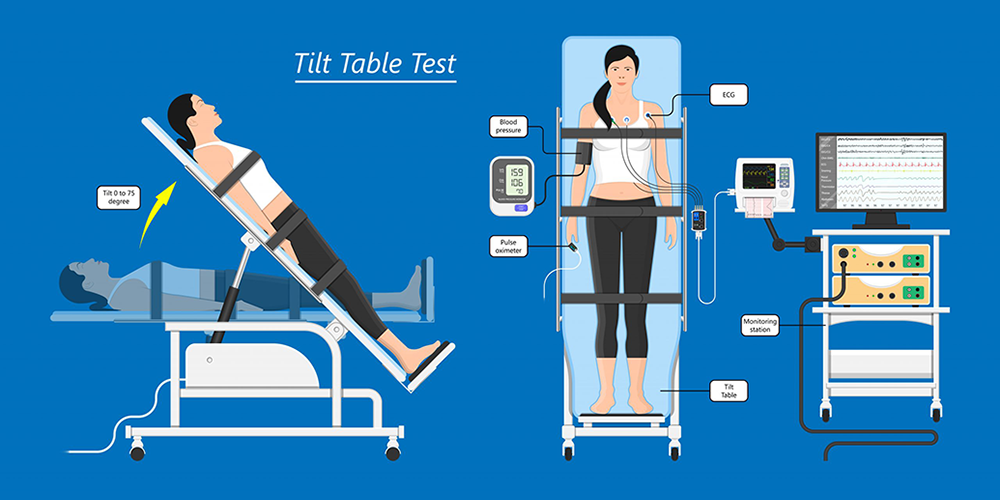TILT TABLE TEST
What is a tilt table test?
The tilt table test (also called a passive head-up tilt test or head upright tilt test) records your blood pressure, heart rhythm and heart rate on a beat-by-beat basis as the table is tilted to different angles. The table always stays head-up.

Why do I need this test?
The test shows how different positions affect your heart rate, heart rhythm and blood pressure.
Your doctor uses this information to determine the cause of symptoms like light-headedness and fainting spells (syncope) and develop the best treatment plan for you.
Your doctor may order more tests to get a better understanding of your condition.
What is syncope?
Syncope (pronounced “sin ko pea”) commonly called passing out or fainting. It is a brief loss of consciousness and posture caused by a temporary decrease in blood flow to your brain. This decrease can happen because of a sudden drop in your blood pressure or heart rate or changes in the amount or movement of blood in your body. You may be confused for a bit after you become conscious again.
Syncope is often related to another medical condition that may involve your heart, nervous system or blood flow to the brain.
Scheduling the tilt test
The scheduling secretary will tell you when and where to go on the day of your tilt test. If you schedule your test by phone, your appointment schedule will be mailed to you.
If you cannot stand without help or weigh more than 325 pounds, please talk to the office when scheduling this appointment.
How long does the test take?
The test takes about 90 minutes to complete. The test time may be shorter, depending on your symptoms and the way the test affects your blood pressure, heart rhythm and heart rate. Plan on being at Cleveland Clinic for about 2 hours.
Should I take my medications?
Take your prescription medications as you normally would, with small sips of water. If you take a diuretic (“water pill”), ask your healthcare provider if it is okay to wait until after the test to take medication.
If you have diabetes, or take insulin, ask your doctor how you should take your medications on the day of your test. Please bring your glucose meter to check your sugar if it feels low on your way to the hospital. If you do not have a meter, please let us know so we can give you one to use.
Do not stop taking any medication without first talking to your healthcare provider.
If you have any questions, talk to your doctor.
Can I eat before the test?
Eat a normal meal the evening before your procedure. DO NOT eat or drink anything except small sips of water for 4 hours before the test. You can eat normally after the test unless you have other tests scheduled that require you to fast.
What should I wear?
Wear comfortable clothes and shoes. You may wear a short-sleeved or sleeveless t-shirt in place of a hospital gown. If you are wearing a long-sleeved or tight-fitting shirt, you may need to change into a hospital gown for the test.
What should I bring?
Please bring the following information with you to your test:
- List of current medications and dosages
- List of allergies (including medication, food and environmental allergies)
- Your insurance card
Where is the test performed?
The test is performed in a cardiology lab called the Tilt Lab.
What happens just before the test?
A doctor will explain the details of the test, answer your questions and have you sign a consent form. You may sign the consent form during a visit before the day of your test. A nurse will help you get ready for the test and answer any other questions you have.
Tilt table: You will lie on the tilt table. This is a motorized table with a metal footboard. Your feet will rest against the footboard. Soft Velcro straps will be placed across your body; however, you will need to support your own weight during the test.
IV placement: You will have an IV in a vein in your arm or on the back of your hand. If needed, the IV will be used to take blood samples and give you medication(s) during the test.
Blood pressure cuffs will be placed around one of your arms and a finger . The cuffs are attached to monitors used throughout the test. The finger cuff will pump nonstop throughout the test. The arm cuff will check your blood pressure every 4 to 10 minutes.
If one of your arms cannot be used for an IV or blood pressure, please tell us before the test begins.
Electrodes: Small, sticky patches called electrodes will be placed on your chest. The electrodes are connected to an electrocardiograph monitor (EKG) that records the electrical activity of your heart as a graph or series of lines on a moving strip of paper. The EKG shows your heart rate and rhythm during the test.
What happens during the test?
There will be 2 nurses or a nurse and a technician with you throughout the entire test.
You will rest for 15 minutes. Then, as you lie still, we will record your blood pressure and ECG.
Your blood pressure, heart rhythm and heart rate will be constantly monitored throughout the test. The data is recorded and stored in a computer.
The motorized table is controlled by a nurse. The table will be tilt to 30 degrees for 2 to 3 minutes, 45 degrees for 2 to 3 minutes, and 70 degrees for up to 45 minutes. You will always be upright during the test.
We will try to keep you as comfortable as possible throughout the test. It is important to move as little as possible during the test.
- Stay as still and as quiet as possible during the test so we can record accurate test results.
- Do not move your legs while you are in the standing position.
- Please try not to talk unless you need to.
- Tell us about symptoms you have during the test.
How will I feel during the test?
We will ask you how you feel throughout the test. You may not have any symptoms, or you may have pre-syncope symptoms (premonitory symptoms). These can include, but are not limited to, feeling light-headed, dizzy, nauseous, palpitations (fluttering in the chest) and blurred vision.
The purpose of the test is not to make you faint, although you may, depending on how you respond to the test.
It is important to tell the staff how you feel throughout the test. We will ask you to rate your symptoms on a scale of 1 to 10 (10 is the most severe). Your symptoms, along with the information we collect during the test, help your doctor figure out what is causing your syncope.
Please tell us if you feel like you cannot continue the test because of symptoms you have. We will stop the test if absolutely necessary. But, if we feel you can safely continue the test, we will encourage you to so we can get the most complete results possible.
What happens after the test?
After the test is finished, the table will be lowered to a flat position. You will stay on the table for 5 to 10 minutes as you lay flat so we can make sure you’re ok and measure your blood pressure, heart rate, heart rhythm, and record ECGs.
It is rare for severe symptoms to continue after the test. But if this happens, you may need an evaluation in the emergency department.
If the tilt test is the last test of the day, we will remove your IV. If you are scheduled for other tests that require an IV, we may leave it in place. The IV will be removed after your final test.
Going home after the test
You must have a responsible adult to drive you home after the test. You will not be able to drive for the rest of the day. Except in rare instances, you will be able to go home after the test is finished.
What are the risks of the test?
All tests and procedures carry some risk. Your healthcare provider will talk to you about the risks and benefits of the tilt table test before you agree to have the test. The test can be modified, if needed, to reduce your chance of any potential risks.
What the test results mean
The doctor assigned to the lab will review the results and may talk to you about the results if you had significant changes in blood pressure, heart rhythm or heart rate; if you fainted; or if symptoms continue after the test.
A positive tilt table test means you may have a condition that causes an abnormal change in blood pressure, heart rate or heart rhythm.
A negative tilt table test means that there were no signs of a condition that causes an abnormal change in your blood pressure, heart rate or heart rhythm.
A cardiologist will review the results of your test and electronically share them with your referring doctor. If requested, we can fax a copy to your doctor’s office.
Do I need more tests?
Depending on the results of the tilt table test, you may need more tests to determine the cause of you syncope. These tests can include: :
- Hemodynamic test with echo to check the distribution of blood throughout your body, the pressure in your blood vessels, and how well your heart pumps blood throughout your body.
- An autonomic reflex test to check your autonomic nervous system, which controls involuntary functions like breathing, heartbeat and digestion.
- Other tests: Sometimes other tests, such as a vestibular function test, heart rate monitoring and echocardiogram, are also needed.
Your healthcare team will talk to you about any additional tests you need before they are scheduled.
Follow-up care
Your referring doctor will explain the test results to you and talk to you about your plan of care.
It is important to ask your doctor about medications. You may need to make changes to the types or amounts of medications you take.
In life we all need role models, if I was in training to be a doctor you would certainly fit that role for me. I thank you so much for what you have done to allow me to continue with my fitness regime and wish you well in the life ahead of you.
A great team player, all of the nursing staff are very happy to work with Salahaddin as he is polite, efficient, and has a great aura of calmness and competence and appreciates the time to be light-hearted.
Your kindness and good humour were very much appreciated and certainly put me at ease throughout the procedure, which on other ocassions has been quite daunting, your relaxed approach to my problem was very calm and professional.
What I valued as much as his erudition was his people skills, he related to everyone as an individual, his understanding, communications, interactions and personable nature were exceptional. Dr Ubaid was quite simply staggering, he is somebody that has had a significant impact on me, not just for giving me my life back and for his medical genius but for being the person that he is.
In Dr Salahaddin Ubaid I had a medical genius who also contributed significantly to aiding me overcome all of the negative worries and emotions I was feeling. The care he provided to me, his attention to detail, his personal knowledge, expertise, experience and skills was outstanding.
His presence radiates a warmth, he instils confidence in all those around him, he sets an example for others to follow and is a role model for others to aspire to be like. He was kind, courteous, professional, understanding, caring and highly approachable and relatable as well as the medical guru we all benefit from and rely on to give us our lives back.
Dr Ubaid works well with all the staff. His approach to his fellow workers is both patient and respectful. His easy going manner makes him very approachable to ask advice and he accommodates any delays graciously. I personally look forward to working with him.






